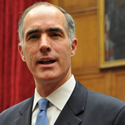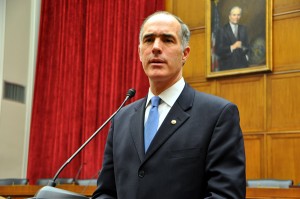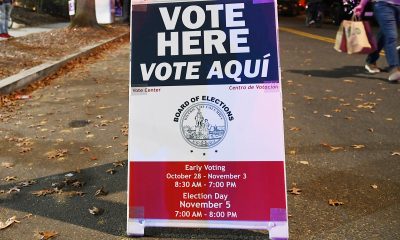National
Casey introduces anti-bullying legislation
SSIA contains provisions against harassment online

A U.S. senator from Pennsylvania on Tuesday reintroduced legislation aimed at thwarting the bullying of LGBT students with a new provision geared toward protecting against harassment via the Internet.
Sen. Bob Casey (D-Pa.) introduced the bill, which is dubbed the Safe Schools Improvement Act. Joining him as an original co-sponsor is Sen. Mark Kirk (R-Ill.) as well as 18 other members of the Senate Democratic caucus.
In a conference call on Tuesday, Casey said the measure was introduced to help ensure that students feel safe as they complete their studies.
“This is in my judgment the ultimate betrayal of a child,” Casey said. “They should go to school with a reasonable expectation that they’re going to be safe, and when they’re not safe, it’s our fault across the country — those of us who are elected officials and those who have anything to do with this challenge of making sure that our children can be educated.”
If the legislation were to pass, schools that receive federal funding would have to establish codes of conduct explicitly prohibiting bullying and harassment. Additionally, the bill would require states to collect data on incidents of bullying and report the information to the Department of Education, which will make the data available to parents and local communities.
Further, the Department of Education would have to provide Congress with a report every two years on the state-reported data, along with other specified data.
Kirk, who was also on the conference call, said his priority in the bill was a provision that wasn’t in the legislation during the previous Congress — language explicitly protecting students against bullying that they could encounter online, such as threats on their Facebook pages.
The new bill clarifies that “electronic communications” are a context in which students could experience harassment.
“It’s incumbent on the national legislature to keep up to speed with what’s happening in the country, and cyber-bullying is now very much a part of 21st century American life,” Kirk said.
Stacy Skalsi, director of public policy for the National Association of School Psychologists, said her organization supports the Safe Schools Improvement Act out of concern for bullied students as well as those engaging in bullying to help guide them to make better decisions.
“We’re really concerned that schools really need to some guidance to move forward,” she said. “There’s still a lot of confusion and ambiguity about how to respond to the problem.”
Casey said bullying that LGBT students and students with disabilities face in school was in particular a motivation for introducing the measure. The senator cited a 2009 study from the Gay, Lesbian and Straight Education Network finding that eight in 10 LGBT students say they’ve faced bullying in the last year.
“If it were one in 10, it would be totally unacceptable, but the fact that there are that many in this survey is particularly disturbing,” Casey said.
Charles Robbins, executive director of the Trevor Project, said the Safe Schools Improvement Act would be effective in mitigating the harassment faced by LGBT students.
“Protecting young people from negative school environments plays a critical role in effective suicide prevention,” Robbin said. “The Safe Schools Improvement Act will improve outcomes for elementary and secondary-aged youth nationwide by collecting and reporting on instances of bullying and helping to provide better services for youth who are at risk, including lesbian, gay, bisexual, transgender and questioning youth.”
Dennis Van Roekel, president of the National Education Association, also expressed support for the legislation on behalf of his organization.
“NEA strongly supports the Safe Schools Improvement Act and ridding schools of bullying and harassment,” Van Roekel said. “Our children are America’s greatest resource. And as educators, we want nothing more than to create a climate of civility and respect for all students, including LGBT students, in every public school.”
In the House, Rep. Linda Sanchez (D-Calif.) is set to introduce companion legislation. Kirk said Rep. John Shimkus (R-Ill.), whom he described as a leader in anti-bullying efforts, could be an original co-sponsor of the legislation.
LGBT advocates have been talking about including this legislation — as well as the Student Non-Discrimination Act — as a component of Elementary & Secondary Act reauthorization when it comes before lawmakers during this Congress.
But Casey said many options are on the table for passing the legislation and he didn’t want to pin down any route for enacting it into law.
“We’re probably going to … debate the best way to move forward, and a lot of that, of course, is going to depend upon what happens on the budget and on the floor, so I don’t think we’re certain yet, just as we’re not certain about a lot of pieces of legislation,” Casey said.
Download a copy of the bill here.

The Comings & Goings column is about sharing the professional successes of our community. We want to recognize those landing new jobs, new clients for their business, joining boards of organizations and other achievements. Please share your successes with us at [email protected].
Congratulations to Gil Pontes III on his recent appointment to the Financial Advisory Board for the City of Wilton Manors, Fla. Upon being appointed he said, “I’m honored to join the Financial Advisory Board for the City of Wilton Manors at such an important moment for our community. In my role as Executive Director of the NextGen Chamber of Commerce, I spend much of my time focused on economic growth, fiscal sustainability, and the long-term competitiveness of emerging business leaders. I look forward to bringing that perspective to Wilton Manors — helping ensure responsible stewardship of public resources while supporting a vibrant, inclusive local economy.”
Pontes is a nonprofit executive with years of development, operations, budget, management, and strategic planning experience in 501(c)(3), 501(c)(4), and political organizations. Pontes is currently executive director of NextGen, Chamber of Commerce. NextGen Chamber’s mission is to “empower emerging business leaders by generating insights, encouraging engagement, and nurturing leadership development to shape the future economy.” Prior to that he served as managing director of The Nora Project, and director of development also at The Nora Project. He has held a number of other positions including Major Gifts Officer, Thundermist Health Center, and has worked in both real estate and banking including as Business Solutions Adviser, Ironwood Financial. For three years he was a Selectman, Town of Berkley, Mass. In that role, he managed HR and general governance for town government. There were 200+ staff and 6,500 constituents. He balanced a $20,000,000 budget annually, established an Economic Development Committee, and hired the first town administrator.
Pontes earned his bachelor’s degree in political science from the University of Massachusetts, Dartmouth.
Kansas
ACLU sues Kansas over law invalidating trans residents’ IDs
A new Kansas bill requires transgender residents to have their driver’s licenses reflect their sex assigned at birth, invalidating current licenses.

Transgender people across Kansas received letters in the mail on Wednesday demanding the immediate surrender of their driver’s licenses following passage of one of the harshest transgender bathroom bans in the nation. Now the American Civil Liberties Union is filing a lawsuit to block the ban and protect transgender residents from what advocates describe as “sweeping” and “punitive” consequences.
Independent journalist Erin Reed broke the story Wednesday after lawmakers approved House Substitute for Senate Bill 244. In her reporting, Reed included a photo of the letter sent to transgender Kansans, requiring them to obtain a driver’s license that reflects their sex assigned at birth rather than the gender with which they identify.
According to the reporting, transgender Kansans must surrender their driver’s licenses and that their current credentials — regardless of expiration date — will be considered invalid upon the law’s publication. The move effectively nullifies previously issued identification documents, creating immediate uncertainty for those impacted.
House Substitute for Senate Bill 244 also stipulates that any transgender person caught driving without a valid license could face a class B misdemeanor, punishable by up to six months in jail and a $1,000 fine. That potential penalty adds a criminal dimension to what began as an administrative action. It also compounds the legal risks for transgender Kansans, as the state already requires county jails to house inmates according to sex assigned at birth — a policy that advocates say can place transgender detainees at heightened risk.
Beyond identification issues, SB 244 not only bans transgender people from using restrooms that match their gender identity in government buildings — including libraries, courthouses, state parks, hospitals, and interstate rest stops — with the possibility for criminal penalties, but also allows for what critics have described as a “bathroom bounty hunter” provision. The measure permits anyone who encounters a transgender person in a restroom — including potentially in private businesses — to sue them for large sums of money, dramatically expanding the scope of enforcement beyond government authorities.
The lawsuit challenging SB 244 was filed today in the District Court of Douglas County on behalf of anonymous plaintiffs Daniel Doe and Matthew Moe by the American Civil Liberties Union, the ACLU of Kansas, and Ballard Spahr LLP. The complaint argues that SB 244 violates the Kansas Constitution’s protections for personal autonomy, privacy, equality under the law, due process, and freedom of speech.
Additionally, the American Civil Liberties Union filed a temporary restraining order on behalf of the anonymous plaintiffs, arguing that the order — followed by a temporary injunction — is necessary to prevent the “irreparable harm” that would result from SB 244.
State Rep. Abi Boatman, a Wichita Democrat and the only transgender member of the Kansas Legislature, told the Kansas City Star on Wednesday that “persecution is the point.”
“This legislation is a direct attack on the dignity and humanity of transgender Kansans,” said Monica Bennett, legal director of the ACLU of Kansas. “It undermines our state’s strong constitutional protections against government overreach and persecution.”
“SB 244 is a cruel and craven threat to public safety all in the name of fostering fear, division, and paranoia,” said Harper Seldin, senior staff attorney for the ACLU’s LGBTQ & HIV Rights Project. “The invalidation of state-issued IDs threatens to out transgender people against their will every time they apply for a job, rent an apartment, or interact with police. Taken as a whole, SB 244 is a transparent attempt to deny transgender people autonomy over their own identities and push them out of public life altogether.”
“SB 244 presents a state-sanctioned attack on transgender people aimed at silencing, dehumanizing, and alienating Kansans whose gender identity does not conform to the state legislature’s preferences,” said Heather St. Clair, a Ballard Spahr litigator working on the case. “Ballard Spahr is committed to standing with the ACLU and the plaintiffs in fighting on behalf of transgender Kansans for a remedy against the injustices presented by SB 244, and is dedicated to protecting the constitutional rights jeopardized by this new law.”
National
After layoffs at Advocate, parent company acquires ‘Them’ from Conde Nast
Top editorial staff let go last week

Former staff members at the Advocate and Out magazines revealed that parent company Equalpride laid off a number of employees late last week.
Those let go included Advocate editor-in-chief Alex Cooper, Pride.com editor-in-chief Rachel Shatto, brand partnerships manager Erin Manley, community editor Marie-Adélina de la Ferriére, and Out magazine staff writers Moises Mendez and Bernardo Sim, according to a report in Hollywood Reporter.
Cooper, who joined the company in 2021, posted to social media that, “Few people have had the privilege of leading this legendary LGBTQ+ news outlet, and I’m deeply honored to have been one of them. To my team: thank you for the last four years. You’ve been the best. For those also affected today, please let me know how I can support you.”
The Advocate’s PR firm when reached by the Blade said it no longer represents the company. Emails to the Advocate went unanswered.
Equalpride on Friday announced it acquired “Them,” a digital LGBTQ outlet founded in 2017 by Conde Nast.
“Equalpride exists to elevate, celebrate and protect LGBTQ+ storytelling at scale,” Equalpride CEO Mark Berryhill said according to Hollywood Reporter. “By combining the strengths of our brands with this respected digital platform, we’re creating a unified ecosystem that delivers even more impact for our audiences, advertisers, and community partners.”
It’s not clear if “Them” staff would take over editorial responsibilities for the Advocate and Out.




















